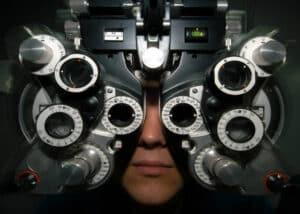Optometrist vs. Ophthalmologist: Which One You Need
Choosing between a Seattle optometrist and ophthalmologist? Discover their distinct roles—primary care vs. surgical expertise—and how local collaboration ensures precise, tailored eye health solutions.
Key Takeaways: Optometrist vs. Ophthalmologist in Seattle
-
Optometrists (OD):
-
Primary eye care providers for Seattle patients.
-
Handle routine exams, glasses/contacts, dry eye, early-stage glaucoma, and non-surgical injuries.
-
Prescribe medications and co-manage pre-/post-op care with surgeons.
-
-
Ophthalmologists (MD/DO):
-
Surgical specialists for cataracts, retinal detachments, and complex diseases like wet AMD.
-
Treat emergencies (e.g., trauma, sudden vision loss) and advanced conditions.
-
Partner with Seattle optometrists for streamlined referrals and follow-ups.
-
-
Collaborative Care in Seattle:
-
Clinics like Cannon EyeCare combine both specialties for seamless treatment.
-
Example: Optometrists monitor cataracts; surgeons operate; optometrists manage recovery.
-
-
When to Choose:
-
Optometrist: Yearly exams, prescription updates, non-surgical issues.
-
Ophthalmologist: Surgery, severe diseases, emergencies.
-
-
Local Expertise:
-
Seattle optometrists prioritize medical eye care beyond basic vision services.
-
Dr. Mark Cannon (Cannon EyeCare) ensures trusted, coordinated care since 2005.
-
Should You Visit an Optometrist or Ophthalmologist
Most patients schedule annual eye exams (or as needed), but many wonder: Should I see an optometrist or ophthalmologist? While both are called “eye doctors,” they serve distinct roles. Your Seattle optometrist acts as a primary care provider for routine vision needs, while an ophthalmologist in Seattle is a medical or surgical specialist. Both differ from opticians, who focus on eyewear fittings and repairs.
Let’s clarify further. Optometrists and ophthalmologists are doctoral-level clinicians trained to diagnose and treat eye conditions. Key differences include:
- Optometrists (OD): Provide primary eye care, prescribe glasses/contacts, manage conditions like dry eye or diabetes-related issues, and refer patients to specialists.
- Ophthalmologists (MD/DO): Perform surgeries (e.g., cataract removal), treat complex diseases (e.g., glaucoma), and often handle advanced medical cases.
While their expertise varies, collaboration is common. Many Seattle clinics, like Cannon EyeCare, combine both specialties under one roof for comprehensive care. For example, Dr. Mark Cannon, a trusted Seattle optometrist, trained at a Seattle-metro ophthalmology clinic post-graduation, ensuring seamless coordination between routine care and surgical solutions.
This teamwork model ensures Seattle-area patients receive tailored care, whether routine exams or specialized treatment, while maintaining expertise, efficiency, and trust.
What can an optometrist do?
In healthcare, an optometrist’s “scope of practice” defines their licensed capabilities. Seattle optometrists, like those at Cannon EyeCare, are trained to:
- Diagnose and treat ocular diseases (e.g., corneal abrasions, keratitis, blepharitis, iritis).
- Prescribe both eye-specific and oral medications to manage conditions.
- Address chronic issues like dry eye, glaucoma, and macular degeneration (excluding severe surgical cases).
- Provide precision glasses and contact lens prescriptions tailored to your vision needs.
While many associate optometrists with routine vision correction, their role extends far beyond. For example, Cannon EyeCare’s Seattle-based optometrists specialize in medical eye care, offering advanced treatments for injuries and inflammation. However, the scope varies by practice: some focus on comprehensive care, while others (e.g., retail clinic optometrists) may prioritize basic vision services.
How are ophthalmologists different?
Ophthalmologists are medical doctors (MDs/DOs) specializing in surgical and advanced medical eye care. In the Seattle Metro area, most focus on subspecialties like cataract surgery, corneal disorders, or retinal conditions. While general ophthalmologists exist locally, complex cases (e.g., retinal detachment) are typically referred to Seattle-based specialists equipped with advanced tools and expertise.
Key distinctions include:
- Surgical Expertise: Perform procedures like cataract removal, laser surgery, and retinal repairs.
- Advanced Care: Treat severe conditions (e.g., diabetic retinopathy, wet AMD) requiring medical or surgical intervention.
- Collaborative Role: Often partner with optometrists for pre-/post-operative care. For example, Northwest Eye Surgeons employs Dr. Landon Jones, OD, FAAO, a Seattle optometrist who co-manages retinal patients, determining if surgery is needed.
Case Study: Cataract Care in Seattle
- Primary Care: Your Seattle optometrist (e.g., Cannon EyeCare) monitors cataract progression during annual exams.
- Referral: When glasses no longer suffice, they refer you to a trusted Seattle ophthalmologist.
- Surgery & Follow-Up: The surgeon performs cataract removal, while your optometrist handles pre-/post-op visits.
Summary
For routine exams and non-surgical needs, a primary care optometrist in Seattle is ideal. They maintain your eye health, update prescriptions, and coordinate specialist referrals when required.
When to See an Optometrist vs. an Ophthalmologist?
Choosing the right eye care provider in Seattle, WA, depends on your needs. Here’s a local-focused guide:
See a Seattle Optometrist For:
- Routine Exams: Annual checkups, glasses/contacts prescriptions, and vision updates.
- Early-Stage Conditions: Dry eye, allergies, mild glaucoma, or diabetic eye monitoring.
- Eye Injuries: Corneal abrasions, infections (e.g., blepharitis), or inflammation (iritis).
- Pre-/Post-Op Care: Coordinating with Seattle ophthalmologists before/after surgeries like LASIK.
Visit a Seattle Ophthalmologist For:
- Surgical Needs: Cataract removal, retinal detachment repair, or laser procedures.
- Complex Diseases: Advanced glaucoma, wet AMD, or corneal transplants.
- Sudden Emergencies: Trauma, sudden vision loss, or post-surgery complications.
Local Collaboration Example
At Cannon EyeCare, Seattle optometrists work closely with Seattle-metro ophthalmologists to streamline referrals. For instance, if cataracts impair your daily life, your optometrist will connect you to a trusted surgeon while managing pre-op testing and post-op adjustments.
Sincerely,
Dr. Mark J. Cannon, OD
Cannon EyeCare at Market Optical
Trusted Seattle Optometrist Since 2005
FAQs
-
Who Should I See for Routine Eye Exams in Seattle?
Visit a Seattle optometrist like those at Cannon EyeCare for annual exams, prescription updates, and screenings for conditions like glaucoma or dry eye. Optometrists are primary eye care providers and coordinate referrals to Seattle ophthalmologists if surgery is needed.
-
What Conditions Do Seattle Ophthalmologists Treat?
-
Where Can I Get Cataract Surgery?
-
Why Choose an Optometrist Over an Ophthalmologist for Dry Eye?
-
Will My Insurance Cover a Seattle Optometrist Visit?
-
What’s the Difference Between an OD and MD in Eye Care?
-
Can Optometrist Prescribe Medications?




